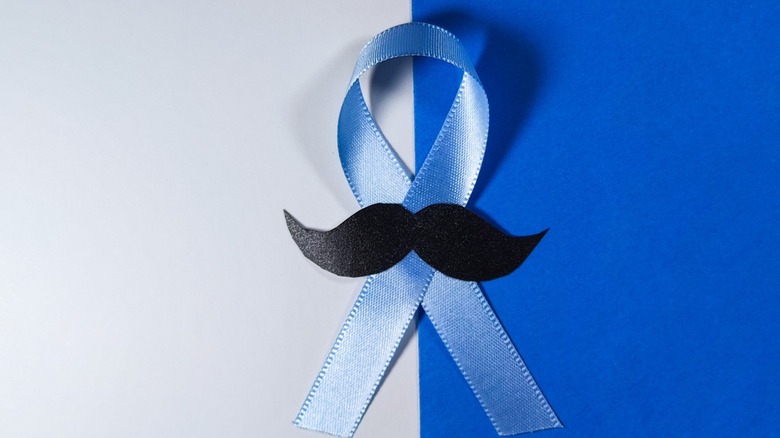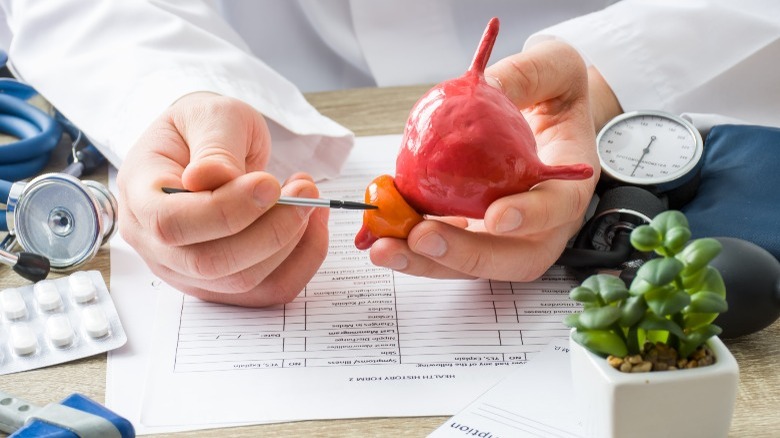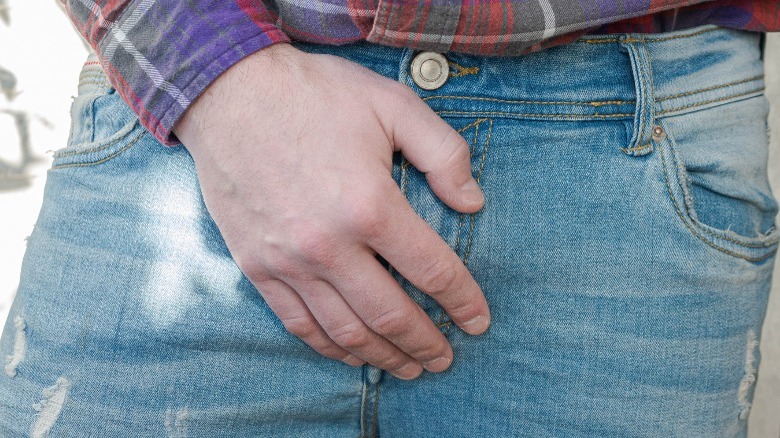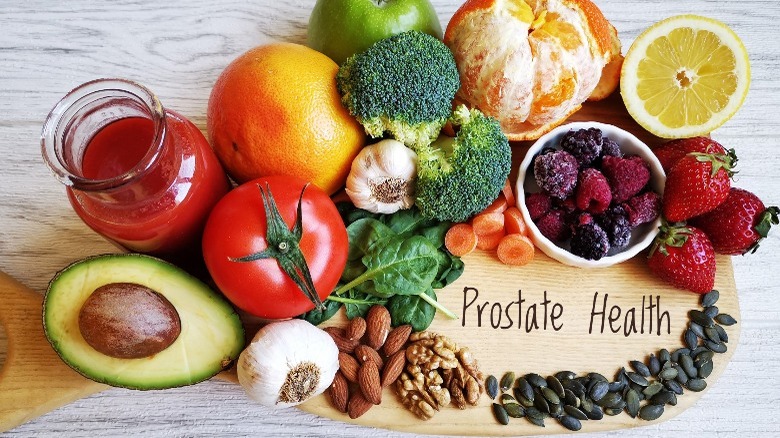Natural Ways Men Can Boost Their Prostate Health As They Age - Exclusive
According to the University of Tennessee Medical Center, the month of September is the National Prostate Cancer Awareness month. Despite the fact that millions of men are negatively affected by prostate issues, many men remain unaware of the prostate, its functionality, and the importance of maintaining prostate health as they age. Notably, while women have homologous glands often called the female prostate, or Skene's glands, some experts say that women do not "have a prostate gland" (via Healthline).
In an exclusive interview with Health Digest, Dr. Jamin Brahmbhatt, board-certified urologist, discusses the anatomy and function of the prostate, the prevalence of issues in men as they age, who is at the most risk of developing issues, and the symptoms of an enlarged prostate. Additionally, Dr. Brahmbhatt provides a few tips on how men can support their prostate health through lifestyle choices in addition to diet and a few choice natural supplements.
What is the prostate and how common is an enlarged prostate as people age?
Dr. Brahmbhatt says that it is important to educate men on the prostate because many are unaware of what it is and what it does. "The prostate is a strawberry-sized organ that is part of the male reproductive system. It sits in front of the bladder and above the rectum," says Dr. Brahmbhatt. The prostate has an important bodily function. "The prostate is responsible for the production and supply of fluid that helps nourish sperm in the ejaculate. The urethra, where urine travels from the bladder to the penis, runs through the prostate," says Dr. Brahmbhatt.
As men age, beginning in their mid-30s, the prostate grows bigger due to a range of factors. According to Dr. Brahmbhatt, family history, lifestyle, diet, and natural hormonal changes are all factors. "As the prostate enlarges, it might press against the urethra and restrict the flow of urine. This condition is called benign prostatic hyperplasia, or BPH," says Dr. Brahmbhatt. However, BPH is not the same thing as prostate cancer, and it turns out that BPH is more common than prostate cancer. Dr. Brahmbhatt adds, "Over 40% of men in their 50's start having symptoms from [an] enlarged prostate. The percentage jumps to over 90% in men over the age of 80!"
What are the symptoms of an enlarged prostate?
"As the prostate grows from the size of a strawberry to the size of an avocado, the restriction in flow can lead to changes in urine flow and quality of life," says Dr. Brahmbhatt. He explains that it is important to pay attention to your body, as there are some telltale signs of an enlarged prostate. For example, if a stream of urine is not as strong as usual, you're urinating more during the night, and having to go suddenly during the day, you may be experiencing symptoms of BPH.
Some men look the other way with these symptoms because they think it is just a regular part of aging. But ignoring these symptoms can lead to continued negative effects day-to-day. Dr. Brahmbhatt cautions that these symptoms can "have a significant impact on [one's] overall quality of life, including disrupting sleep and a lower sex drive, and as a result, can affect spouses or partners as well."
What can men do to support their prostate health?
You might wonder: what can men do to support prostate health? It turns out that staying healthy is the simplest and most effective way. "The healthier you are, the less chance you have of diabetes, heart attacks, strokes, obesity — all of which can affect your urinary system's ability to function," says Dr. Brahmbhatt. "Studies have found that overweight men have an increased risk of BPH. Studies have also shown that moderate or vigorous exercise can reduce the risk of BPH and urinary symptoms," says Dr. Brahmbhatt. As such, it is recommended that overweight men lose weight, because it is a natural way to support prostate health.
Chronic stress is another factor that can hinder prostate health. "Stress may cause men to tighten their pelvic muscles, which may increase symptoms of an enlarged prostate or even put them at risk for chronic prostate inflammation (prostatitis)," says Dr. Brahmbhatt. He adds that, "Hormonal and physiological changes from stress can increase urinary urgency and frequency." You can try to manage stress through breathing exercises, or even taking a vacation. The results may also support your mental health, adds Dr. Brahmbhatt.
Other ways to support prostate health naturally
"A prostate friendly diet also supports prostate health," says Dr. Brahmbhatt. "This includes a balanced diet full of greens, less processed foods, less saturated fats, and [less] sugar — just think the opposite of fast food!" If you want to explore the world of supplements, there are natural supplements that can proactively support prostate health. "Research has shown the benefits of a high-quality saw palmetto oil extract on reducing prostate inflammation and urinary symptoms," says Dr. Brahmbhatt. "Studies have shown saw palmetto at 320mg/day and at least 80% fatty acid content can decrease urinary symptom scores by 5 or more points, improve quality of life by 39%, and up to 27% improvement in flow rate."
In fact, Dr. Brahmbhatt recently co-authored a 2022 study published in the journal Uro, which concluded that high-quality saw palmetto oil extract could be a good option for supporting prostate health. Dr. Brahmbhatt concludes with the following advice, "for natural ways to support prostate health, it all comes down to choosing the right food or supplement!"
To find out more about Dr. Jamin Brahmbhatt, you can visit JaminBrahmbhatt.com and Flomentum.com. You can learn more about the published study here.





